From 1916 to 1975, Tuvalu was part of the Gilbert and Ellice Islands colony of the United Kingdom. A referendum was held in 1974 to determine whether the Gilbert Islands and Ellice Islands should each have their own administration. As a consequence of the referendum, the separate British colonies of Kiribati and Tuvalu were formed. Tuvalu became fully independent as a sovereign state within the Commonwealth on 1 October 1978. On 5 September 2000, Tuvalu became the 189th member of the United Nations.
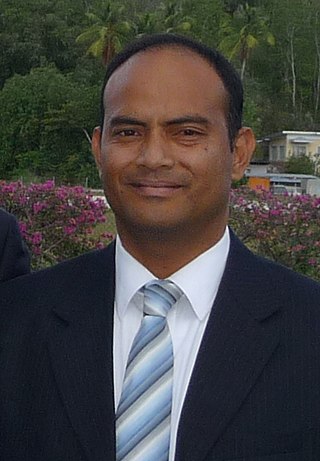
David Waiau Adeang is a Nauruan politician, former Speaker of the Parliament of Nauru, and Nauru's Minister of Finance and Justice, as well as the Minister Assisting the President of Nauru. He is a founding member of the Naoero Amo, currently the only successful political party on the island.

After the establishment of diplomatic ties with the Soviet Union after the Cuban Revolution of 1959, Cuba became increasingly dependent on Soviet markets and military aid and was an ally of the Soviet Union during the Cold War. In 1972 Cuba joined the COMECON, an economic organization of states designed to create co-operation among the communist planned economies, which was dominated by its largest economy, the Soviet Union. Moscow kept in regular contact with Havana and shared varying close relations until the end of the Soviet Union in 1991. Cuba then entered an era of serious economic hardship, the Special Period.

Niue maintains diplomatic relations with various other countries and multilateral organizations.

Oceania is, to the People's Republic of China and the Republic of China, a stage for continuous diplomatic competition. The PRC dictates that no state can have diplomatic relations with both the PRC and the ROC. As of 2019, ten states in Oceania have diplomatic relations with the PRC, and four have diplomatic relations with the ROC. These numbers fluctuate as Pacific Island nations re-evaluate their foreign policies, and occasionally shift diplomatic recognition between Beijing and Taipei. The issue of which "Chinese" government to recognize has become a central theme in the elections of numerous Pacific Island nations, and has led to several votes of no-confidence.

Equatorial Guinea – United States relations are bilateral relations between Equatorial Guinea and the United States.
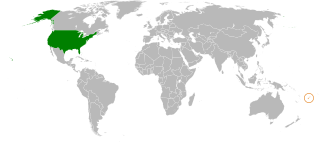
Fiji–United States relations are the bilateral relations between the Fiji and the United States. The relationship has improved significantly since Fiji's elections in September 2014, which restored a democratically elected government to Fiji for the first time since 2006. The United States had opposed Fiji's unelected government, which came to power through a military coup in December 2006.

Kiribati and the United States have diplomatic relations. Geographically, Kiribati is the closest neighboring country to the state of Hawaii.
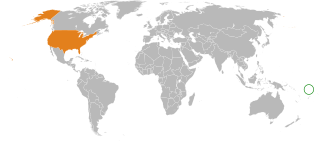
Tuvalu – United States relations are bilateral relations between Tuvalu and the United States.

Fiji and South Korea established official diplomatic relations in January 1971, Korea having recognised Fiji's accession to independence the previous year. There is a South Korean embassy in Suva and a Fijian embassy in Seoul. Fiji opened its embassy in Seoul in July 2012 to "foster trade and investment" and to "promote people-to-people exchanges".
Cuban-Pacific relations are diplomatic, economic, cultural, and other relations between the Cuba and countries situated in Oceania. In the 2000s, Cuba has been strengthening its relations with Pacific nations, which have, for the most part, responded favorably to Cuban medical aid in particular. The first Cuba-Pacific Islands ministerial meeting was held in September 2008 in Havana, with government members from ten Pacific countries—Kiribati, Tuvalu, Nauru, Solomon Islands, Fiji, Tonga, Vanuatu, Samoa, the Federated States of Micronesia and Papua New Guinea—attending. The meeting was a consolidation rather than a starting point of Cuban-Pacific relations.
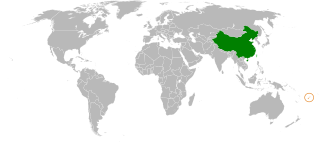
The Republic of the Fiji Islands was the first Pacific Island country to establish diplomatic relations with the People's Republic of China, in 1975. China established an embassy in Fiji in 1976, and Fiji opened its embassy in China in 2001.
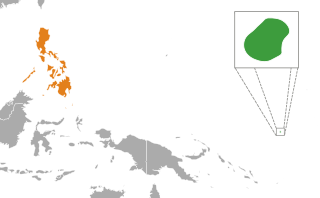
Nauru–Philippines relations are the bilateral relations between Nauru and Philippines. The Philippines maintains relations with Nauru through its embassy in Canberra, Australia

Marie C. Damour is an American diplomat who is the current Ambassador to Fiji, serving concurrently as the ambassador to Kiribati, Nauru, Tonga, and Tuvalu. She previously served as Consul General of the U.S. Consulate General in Ho Chi Minh City, Vietnam.












